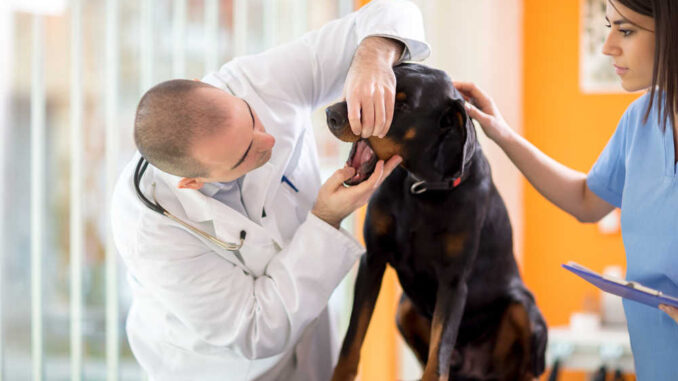
This article was updated on September 28th, 2023
Cancer is always a heartbreaking diagnosis in pets. It often comes unexpectedly and as a shock to pet owners. While mouth cancer is not exceptionally common in dogs, it is still diagnosed far too often. In this article, we will discuss life expectancy and survival rate for dogs with mouth cancer for the three most common malignant oral tumors (mouth cancer): malignant melanoma, squamous cell carcinoma, and fibrosarcoma.
How Will the Vet Treat Mouth Cancer? (and How Effective Are the Treatments)
After a dog has been diagnosed with mouth cancer, treatment will be dependent on the type of cancer diagnosed, location, and evidence of metastasis. A veterinarian will most often achieve a diagnosis with a biopsy either by performing a fine needle aspirate of the mass or a biopsy of the affected area.
Once a diagnosis of cancer is made, staging should be performed with x-rays taken of the chest and sampling of the regional lymph nodes to rule out the spread of cancer. Oral melanomas come with the highest rate of pulmonary metastatic disease but metastasis has also been noted with squamous cell carcinoma.
A CT may be recommended to guide the next steps of how to address the tumor and also to guide surgical planning.
Surgery is recommended to treat most oral tumors. Surgery is often performed by a veterinary specialist such as a dentist or surgeon. The goal of surgery will be to try to remove as much of the tumor as safely as possible. This may mean removing associated teeth and even jaw bone if there is a bony invasion. If there is evidence of spread to local lymph nodes, these will likely be removed as well. Surgical removal may be curative.
If complete removal is not feasible, radiation therapy can be considered an alternative treatment. Chemotherapy may be recommended after surgery depending on the type of cancer.
Life Expectancy of Dogs With Mouth Cancer – Without Treatment
Many dogs can survive for a prolonged period without treatment. The caveat to this is that oral tumors can be extremely painful, cause difficulty eating, and damage the underlying bone. The tumor may not directly cause death, but the poor quality of life will be a big concern. Many dogs will need to be euthanized because they are in chronic pain and will not want to eat.
A decline in quality of life or pulmonary metastatic disease will often lead to euthanasia in dogs with mouth cancer. Without treatment, dogs with oral tumors may only live about two months.
Each type of cancer comes with a different prognosis and life expectancy. We wrote this article to help readers develop a better understanding of mouth cancer in dogs and the life expectancy associated with each type of cancer.
Life Expectancy & Survival Rate by Cancer Type – With Treatment
Squamous Cell Carcinoma
- With surgery, many dogs will be disease free for up to 26 months.
- With surgery and radiation therapy, survival time is between 10-40 months.
- Tonsillar squamous cell carcinoma carries a much worse prognosis and shorter survival times.
Malignant Melanoma
- Median survival times are reported as 219-273 days in dogs who are treated with surgery.
- With radiation, dogs may live up to 211-363 days.
- Large tumors or dogs that have metastatic disease will have a worse prognosis of only 164 days with surgery.
Fibrosarcoma
- With surgery, dogs may have a median survival time of 10.6 months with 50% of dogs surviving to 1 year.
IMPORTANT: Average or median life expectancy data for dogs doesn’t capture variability, with many dogs living significantly longer.
How Will Mouth Cancer Affect My Dog?
Mouth cancer can have a significant impact on the quality of life of your dog. These tumors come in many forms, sizes, and shapes. Some may even spread to distant parts of the body like the lungs. The tumors can develop as growths on the gums, tongue, or the hard or soft palate. Because of the high motion of the mouth, many of these tumors can become ulcerated or break open and begin bleeding. They can also develop secondary infections. Read our article about common mouth tumors (with pictures and vet advice).
Mouth cancer can be painful for dogs and make eating difficult. Small tumors may extend much deeper below the surface of the gums and infiltrate into the underlying jaw bone. In severe cases, this can lead to fractures of the bone.
Signs of mouth cancer include:
- Oral pain
- Bad breath
- Drooling
- Poor appetite/difficulty eating
- Oral Bleeding
- Facial swelling
- Swollen lymph nodes
- Tooth loss
- Bloody drool
How Can I Make My Dog’s Life Better?
There are plenty of things you can do as an owner to make your dog’s life better if they are suffering from mouth cancer:
- Pain management is important as the tumors can be invasive and cause chronic pain.
- Secondary infections should be managed with antibiotics.
- Dogs may be given appetite stimulants to help boost their appetite if they are eating poorly. A soft diet should be fed for comfort and to prevent trauma to the tumor.
In cases where dogs are in too much pain to eat, the placement of an esophagostomy tube is recommended to provide adequate nutrition. Discourage eating or chewing hard items to prevent ulceration of the tumor and subsequent pain and bleeding.
Read more about mouth tumors (with pictures and vet advice).
FAQs
Is Mouth Cancer Painful for Dogs?
Mouth cancer can become very painful, especially if it becomes ulcerated, infected, or invades into the underlying bone of the jaw. Pain medications are often necessary for comfort. Read our article: Is My Dog In Pain?
How Fast Does Mouth Cancer Spread in Dogs?
Mouth cancers like melanoma and tonsillar squamous cell carcinoma are very likely to spread to distant parts of the body. The rate of spread is unpredictable.
How Do I Feed My Dog With Mouth Cancer?
Dogs with oral tumors should be fed a softened diet either consisting of soaked kibble, wet food, or a slurried diet.
What Foods Fight Mouth Cancer in Dogs?
Food has not been proven to fight mouth cancer in dogs. Lupeol – an extract of certain fruits and vegetables has been found to inhibit melanoma proliferation. This must be given injectibly by a veterinarian.
What Foods Should Be Avoided?
Any dog with oral tumors should not be fed a hard diet as this can cause ulceration of the tumor and pain when eating. They should also not be given hard treats, bones, or chew toys.
When Should I Put My Dog Down If He Has Mouth Cancer?
Dogs with cancer should be euthanized when their quality of life becomes poor. If pain cannot be controlled, dogs stop eating, or metastatic disease is causing significant illness, then euthanasia is a kind choice. Discuss any concerns with your veterinarian and they will help guide you in making this difficult decision.
Why Do Dogs Get Mouth Cancer?
It is not known why these cancers develop. Development is suspected to be due to environmental and genetic factors. Male dogs are noted to be more likely to develop oral cancers. Several breeds are predisposed to mouth cancers including:
- Boxers
- Chow Chows
- German Shepherds
- German Shorthaired Pointers
- Golden Retrievers
- Gordon Setters
- Miniature Poodles
- Weimaraners
Disclaimer: This website's content is not a substitute for veterinary care. Always consult with your veterinarian for healthcare decisions. Read More.


My beautiful 9 yr keeshond has oral cancer which is now in his abdomen and anal sac. He is eating normally bit changed diet to wet food. I have taken him to oncologist and waiting for biopsy and other test results. I am making the heartbreaking decision to have him put down as my last keeshond had a tumor burst in his nasal and died at emergency room. Any thoughts?
Oh I am so very sorry to hear about this, I know this must be such a stressful time for you. Sadly as the cancer has spread, it will be malignant and could go on to cause a wide range of signs. If we feel his quality of life is poor, euthanasia should be considered, yes. You will have more information after discussion with the oncologist once results are in, and they can guide you further. Dr. Linda Simon MVB MRCVS
“The information on this website is not a substitute for in-person veterinary care. Always seek advice from your veterinarian if you have concerns about your pet’s medical condition.”
I am so glad that I stumbled on this site as all the information has been so very helpful in having to make a decision about my dear Standard Poodle. I bought a three year old dog that had sebaceous adenitis and I got that under control by giving her wild salmon oil capsules and a salmon/potato kibble diet. The person that sold the dog of course didn’t tell me about her condition and I never received her medical record like I was promised. She is eleven years old and has now been diagnosed with melanoma and it is going to be heartbreaking to have her put down. I am sure she must be in pain with this cancer and after having had 19 teeth extracted a few years ago I would not want to put her through another surgery that I’m sure would be a very painful recovery. Thank you so much for the informative article. It has been most helpful.